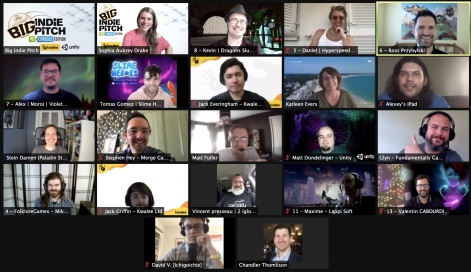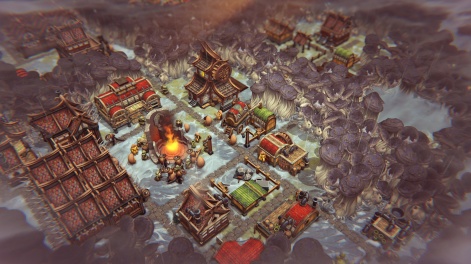The Big Indie Pitch is a regular event run by the makers of Pocket Gamer and PC Games Insider. It sees indie developers engage in a speed-dating-styled pitching competition for fame and those sweet, sweet promotional packages.
The event gives indies five minutes to pitch their games to a panel of press, publishers and industry pundits. The judges then pick three winners and everybody gets valuable feedback.
The indie view
The Big Indie Pitch is getting bigger and bigger as we bring it to events all across the world. To give you an idea of what the event is like, who attends the events and the games on show, we've sat down with a number of past PC Indie Pitch contestants to offer their views.
Today, we're speaking to Eremite Games' Lukasz Korzanowski, who submitted Against The Storm to the PC+Console Big Indie Pitch at Pocket Gamer Connects Digital #7 sponsored by Kwalee & Unity, and walked away as the winner.

Sophia Aubrey Drake: Tell us a little about yourself and your indie studio - who is on the team, and what are their inspirations?
Lukasz Korzanowski: There are five of us working full-time and one contractor composer. Although we’ve only properly established the company in March 2021, most of the team was working on the game after-hours for almost two years now. Previously, we released a premium mobile strategy game called Shattered Plane.
It got a very warm reception from players and appeared high on charts, which reassured us that we’re capable of tackling more complex projects ourselves. We’ve all been working in game development for quite a while (from 5 to 7 years each) for indie, AAA, and mobile developers, but our dream was to establish a new studio and do things our own way. I know it sounds cheesy and cliché, but we’re extremely happy it came true.
Tell us about Against The Storm that you pitched at the competition.
Against the Storm is a roguelite city builder set in a fantasy world where it never stops raining. You are the Queen’s viceroy - a pioneer sent into the wilds to establish and manage new settlements inhabited by beavers, lizards, and humans.
Combining a city builder and a roguelite is a bit like mixing water with oil, but the two public demo versions we released assured us that the core idea is solid. Aside from a strong city builder gameplay loop, the game also features a building drafting system, Dungeon Keeper-style exploration, changing seasons, perks, villager needs, a meta progression system, and more.
What do you think are the most unique and interesting aspects of Against The Storm that gamers may never have seen before.
Predominantly, it’s a rare mixture of city builder and roguelite genres. The second unique aspect is the setting: a world tormented by everlasting rain.
As all indie developers do, we first wanted to create an RPG game with elaborate high-fantasy lore and a big open world that would immerse players for weeks or even months. That’s when we decided on the setting. Our idea was to take the existing world, alter one element, and see if we can come up with interesting and visually appealing concepts. Some of our early concepts were quite bizarre: a game set in a world where everyone is undead, a game in a world where each emotion has a magical manifestation or an adventure set entirely in a leper colony.
The idea that clicked was the one with the endless rainfall. We were brainstorming how the clothes and architecture could look like, what weapons warriors would wield. We designed concepts around various water vessels. So when Damian (2D Artist) showed us the Wok Samurai and the Teapot Hammer, we knew this was it. We didn’t want the game to be realistic, but stylized and quirky.
However, there was still one elephant in the room: how the heck are we going to make an RPG game in a team of 4 (at the time) working after-hours and crunching in daily game developer jobs. Fortunately, only after one rejected prototype, we realized we won’t really be able to compete with other games in the genre. We decided to stick with strategy games, the genre we had the most experience in. After comprehensive market research, we narrowed it down to a city builder, which was starting to get traction again after a few years of being criminally overlooked.
City builders are extremely popular, especially on PC. What made you choose this genre, and what do you think you bring to it that may not have been seen before?
The deciding factor was the team size and project scope. We didn’t want to spend four or five years on an overly ambitious game and risk never finishing it. As we researched different genres, we would often find similarly sized teams with successfully shipped city builders, completed in a reasonable amount of time (even while working after hours). And, of course, we all grew up in the golden age of Sierra Entertainment games, like Caesar, Zeus and Pharaoh, so the choice was super simple for us.
As to what we hope to bring to the genre - the main thing would have to be a new perspective on replayability. In most city builders the planning phase is the most interesting one - when you just landed in a new place and you try to figure out how to make the best of your situation. After you establish a foothold, you’re more or less just going through the motions - expanding the settlement, solving local problems, all the while thinking about what you would’ve done differently if you were to start over.
In Against the Storm we wanted to capture this unique feeling of starting anew and spice it all up with roguelite elements. So in effect, you play shorter sessions, but each one is different - you only have access to a limited amount of buildings in each game, you acquire vastly different perks that synergize with each other, your goals are randomly drawn and the map you play on is procedurally generated. All of this results in a unique settlement that is more reminiscent of a character in a roguelite game than a traditional city in a strategy game.
How did you come to choose the platforms that you would develop Against The Storm for?
One of our main goals for Against the Storm was to develop the game together with the community, as we strongly believe that this is the way to create great experiences. That’s why we chose the Early Access model and PC as our main platform. We hope to create console versions further down the line, and some aspects of the game were already designed specifically to make it easier to port, but for now, we can’t promise anything.
Looking at the studio a little more now. How hard is it to survive as an Indie developer?
We are still in the process of “surviving”, as our future more or less depends on the success of Against the Storm. In hindsight though, the easiest period was when we were working on the game as a side project after hours - there was no budget involved, no deadlines, no strict development plan, just a few passionate indie devs trying to create their own game. When things finally got serious, there were a lot more moving parts to worry about, especially when we quit our jobs, started looking for a publishing partner and were setting up a proper studio all at the same time. To nobody’s surprise, it turns out that the worst part about making games is always the paperwork and legal stuff, not the actual coding or 3D modeling.
Are there any tips and advice you would give to independent developers out there who are just starting out?
Making games is a complex topic and there is no easy recipe for success. We ourselves are just at the beginning of our journey and we certainly still have a lot to learn. However, If we were to give just two pieces of advice, it would be to always keep the scope in check and base your predictions on tangible data.
It’s very tempting to start your adventure with indie game dev by trying to create your opus magnum straight away, whatever it might be - a deep open-world RPG with tons of content, a massively multiplayer online sandbox game or a competitive PVP online hero shooter. But the chances of successfully funding, let alone finishing such a project, are extremely low for small indie teams. It’s better to focus on a game you are sure you can deliver, even if it means your dream game has to wait a little longer.
The other thing to keep in mind is data. There are so many great resources available right now, that there is simply no excuse not to use them. It’s now easier than ever to find out how much a given game has sold, how big of a team created it, what the exact budget was or how long the game was in development. There are countless post mortems on the internet, hundreds of lectures by great industry professionals and dozens of websites with marketing assets and advice (like wishlist to sales conversion estimates, genre vs sales comparisons, etc.). With all that knowledge available, it simply isn’t enough to design a game only based on gut feelings.

How did you find your experience pitching as a part of the Big Indie Pitch?
Although I was super nervous at the beginning, it turned out to be a very pleasant experience. I had an opportunity to chat with other developers before the pitching began which definitely reduced stress. At every point, I was also asked if I have all the information I need, which I did.
What do you feel you have gained from the experience, and what do you still hope to gain?
I quickly learned that time flies faster than you’d expect. The first round of pitching ended midway through my presentation and I knew I have to get to the point sooner next time. This experience allowed me to better structure my pitch and finish on time the second time I pitched.
What are your hopes for this game in the future, and do you have any plans for any future projects?
Against the Storm will be in Early Access on the Epic Games Store for at least a year. During this period you can expect frequent updates, ranging from small balance changes to completely new features and game mechanics. The game was designed from the ground up for the Early Access model, so all systems are modular and can be tweaked and changed very easily. We have a saying in the office, that the real fun will only begin after the Early Access release, as we finally will have the chance to work closely with the community and bring the game to a whole new level.
After a year of Early Access, we will bring Against the Storm to Steam and GOG. We also want to port it to Switch and maybe other consoles, but this is still uncertain. As for future projects - it’s a bit too early to say. We’re still in love with the idea of a small RPG or survival game set in a world plagued by eternal rain, but right now we’re 100% focused on finishing Against the Storm.
Want to show off your exciting new game? We host Big Indie Pitch events throughout the year, so be sure to keep an eye out on our events page for an event near you, or even our new Digital pitches.
All our upcoming pitches including how to enter can be found over on our upcoming events page on BigIndiePitch.com.
Get the latest news, interviews and in-depth analysis on Twitter, Facebook, and our daily newsletter.















